With his old homes turned into museums and an annual festival to celebrate his work, Lucca is the perfect place to delve deeper the history of the great Italian composer Giacomo Puccini, as Charlie Lyon discovers…
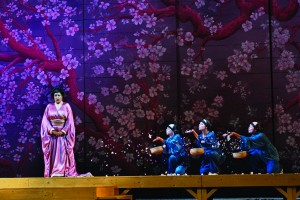
Tonight, the usual tranquility of the banks of Lake Massaciuccoli is broken. On the open-air stage of the Gran Teatro all’Aperto, which backs right onto the serene waters, a ferocious uncle disbands with a roar party guests who have gathered to celebrate the matrimony of 15-year-old Cio-Cio San and Lieutenant Pinkerton. The powerful tenor wreaks havoc on what had been a pretty celebration of love, and even the full moon, which hangs behind the scene in the ink-black sky like a well-positioned prop, looks anguished to hear that it is all over.
The scene before us is part of a spectacular new performance of one of Giacomo Puccini’s great operas, Madama Butterfly, and it is taking place as part of the 60th Puccini Festival, which marks the 90th anniversary of the composer’s death.
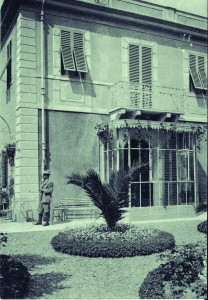
The wide, open-air amphitheatre, in the lakeside town of Torre del Lago, in Lucca, northwest Tuscany, seats 3,400 people and is full of enraptured Italians of all ages and backgrounds, as well as a sprinkling of European tourists. Dressed in anything from cocktail frocks to jeans and smart tops, this stylish setting, with its suave audience, really is the place to experience Italian opera: without pomp, without snobbery, without class boundaries – it is an unforgettable experience.
“This really is the home of quality Puccini singing,” says Vivienne Hewitt, head of external relations for the festival. “Only here can you see the composer’s operas in the magical place which inspired them, a stone’s throw from the Puccini Villa Mausoleum, on the shores of beautiful Lake Massaciuccoli, in untouched parkland.”
But it’s not just the Puccini festival, which runs from the end of July until the end of August each year, that brings music lovers to this amazing place…
“Every Sunday evening, from May until the end of the festival in late August, we put on concerts and events in the park or theatre foyer,” says Vivien. “This August there were concerts with young artists, book presentations and piano concerts using the magnificent £300,000 Fazioli grand piano in our newly built foyer.”
The foyer doesn’t sound too exciting, but it is a destination in itself. With huge, lofty ceilings, a tempting bar and nibbles and members of the casts and production team milling around pre- and post-performance, you can while away hours there.
There’s even an open-door policy for the opera dress rehearsals,” says Vivien. “So you can call in on the day to find out the times and pop along for free to catch full run-throughs of any of the performances.”
Puccini’s patch
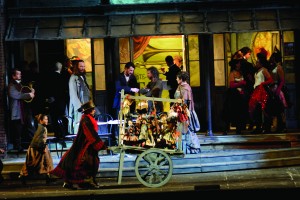
Torre del Lago now has a population of around 11,000, but back in 1891, when Puccini started spending more and more time here, the hamlet boasted a mere 250 inhabitants – mainly fishermen who made their living from the lake’s produce. Puccini built his own villa on the shoreline in 1900, when he was in his early 30s, and moved in with his wife and son. He said he loved the area for its isolation. It was a place, he said, where he could pursue in peace the two pastimes he was most passionate about: hunting and driving fast motorcars.
I find evidence of his daring hobbies at the Villa Puccini Museum, just across the road from the theatre. Puccini did build his villa right on the banks of the lake, but since then the water level has lowered and the shoreline retracted. I stand in a room filled with gigantic rifles almost twice the size of me (who knows how the prey didn’t see him lumbering through the forest with these!), and photographs of Giacomo Puccini next to his latest automobile.
The intimate space also houses the very piano on which Manon Lescaut (1891), La Bohème (1896), Tosca (1900) and Madama Butterfly (1904) were composed, and the many more artifacts reveal a personal side to Puccini that other residences-turned-museums don’t muster nearly as well.
Puccini lived here happily until 1921, surviving a car crash in 1903 that badly injured him and set back his work on Madama Butterfly. He moved finally in 1921, when peat extraction and industrialisation of the lake made it too noisy and polluted. He moved to the seaside city of Viarregio, where he began work on Turandot.
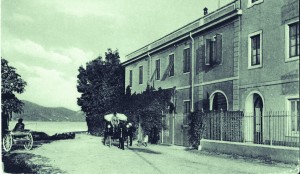
It was to be his final opera, and he was to never see it through, as in 1923 he contracted throat cancer. He died in 1924 following unsuccessful surgery in a Brussels hospital. His body was taken back to a specially created chapel in the Torre del Lago villa, and is buried there now, along with his wife and son, who died later. The opera was completed by Franco Alfano in 1926.
The town of Lucca
Puccini was born in Lucca, a town northwest of Florence, about 30km from the coast. It’s a beautiful walled city, with cobbled streets, sizeable piazzas and ancient architecture.
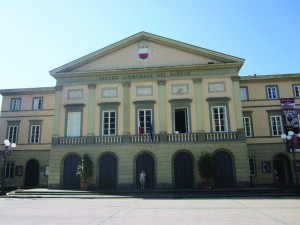
Lucca is known as the ‘Medieval Manhattan’, a result of the fact that property owners used to be taxed according to the width of their buildings, rather than their height. So the buildings grew taller and taller – and the taller your building, the more power you held. And when residents couldn’t build any higher, families often resorted to planting trees on the roofs, examples of which can still be seen today. The buildings are indeed oddities, but intriguing ones. The very brave, and fit, can climb the stairs of a couple of the remaining towers. But be warned, there’s no lift should you not want to come back down the 40 metre high staircase!
“You need 1,000 eyes in Lucca, and it’s not enough,” says our guide, Eleanor Pieruccini, as we trundle through the shady streets, glad of the respite they give us from the August sun. This is certainly true, for as well as marvelling at the medieval architecture like Little Johnny Head-in-the-Airs, Lucca’s residents power around on push bikes. There seem to be few rules as to speed or the side they ride on, and if you don’t leap out of the way of an oncoming wheelie, you’ll be dinged rampantly.
More importantly to Lucca’s music history though, is the house where Giacomo Puccini was born, and the very bed where he came out wailing (in tune, most probably). It’s in Corte San Lorenzo, and a bronze statue of the maestro at ease welcomes visitors. As well as costumes and a working copy of Tosca, the house holds a huge number of handwritten letters – Puccini is said to have written over 8,000 in his life, of which 800 are in this house. The Giacomo Puccini Foundation is working on turning them into a book.
The foundation, and the residents of Lucca, are doing all they can to preserve and promote Puccini’s story. Eleanor tells us that the car park in front of Teatro del Giglio, where all of Puccini’s operas were performed, has only recently been turned into the handsome open space we see. And inside the museum is running an entertaining, if a little unusual, exhibition featuring mannequins dressed as characters from the operas. They sit in the stalls and peer down from the circle in a slightly eerie way. It’s not the sort of place you want to enter alone if you’re nervy. Indeed, there’s even a mannequin of the composer himself in the front box, from which he was known to sit and oversee the staging of his works, barking orders to the cast when things didn’t go to his liking.
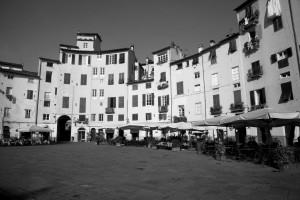
Away from the town of Lucca itself, there is so much more to be enjoyed in this province, the province the locals know as ‘the other Tuscany’. Pisa is just down the road, and the seaside town of Viareggio, which served as the composer’s last home, offers sun, sand and a glimpse of 1920s frivolity. And the regional parklands where he would hunt wild hogs are open for ambling. If you time it right, the Puccini Festival can act as the springboard to launch yourself deeper into a trip full of history, drama and entertainment.
Photography © Comune di Viareggio, Archivio storico, fototeca, unless otherwise stated
